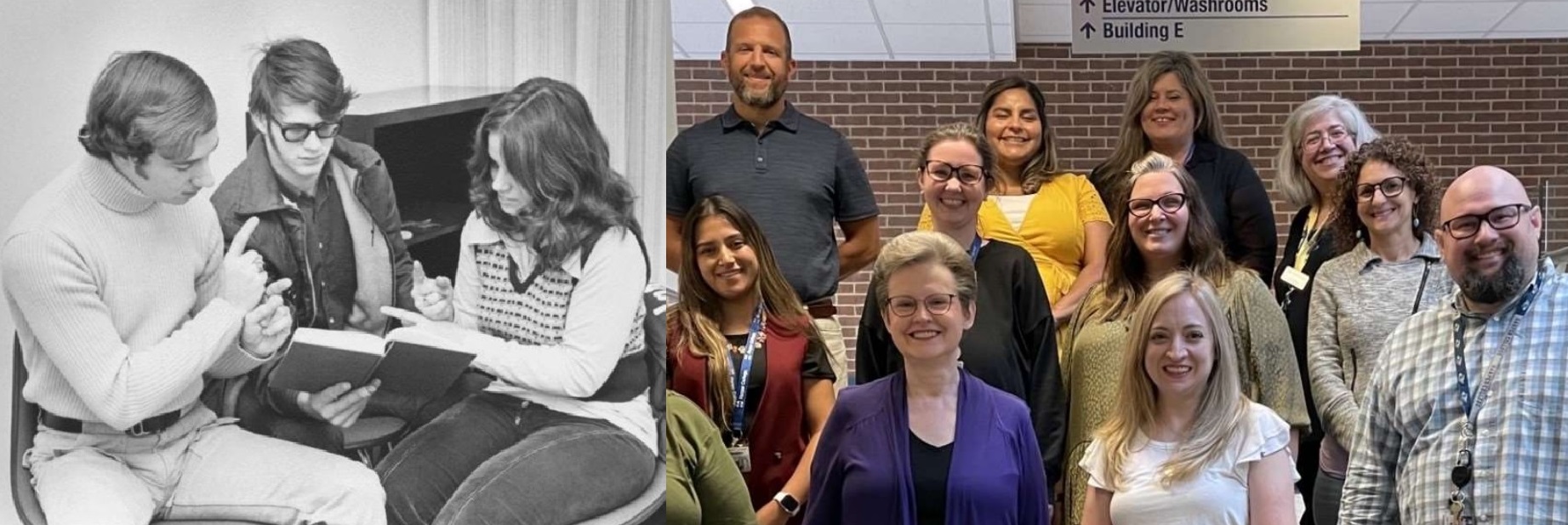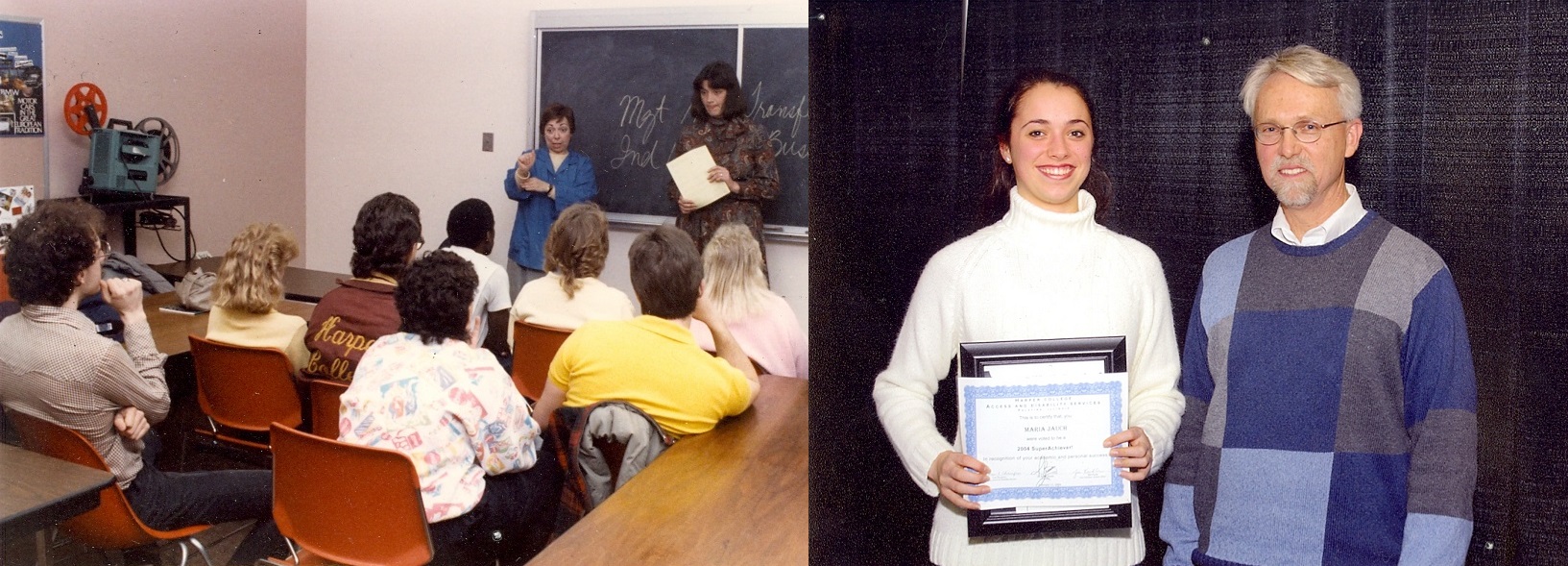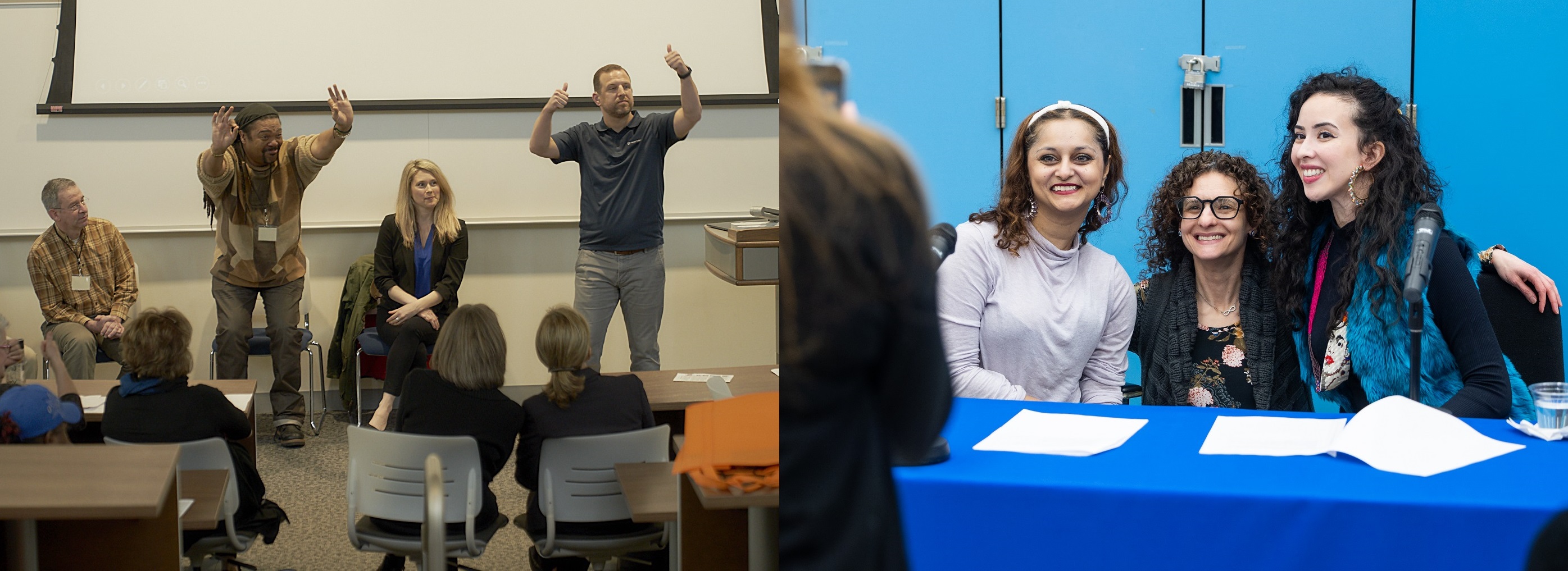

The roots of Harper College's Office of Access and Disability Services go back to the 1970s (left) and support for students who were deaf. In 2023, ADS staff are celebrating 50 years of disability services at Harper.
With a legacy of 50 years of service to Harper College and the Harper community, the Office of Access and Disability Services (ADS) has a long history of putting students first.
“ADS is here for the students,” said Lori Eshoo, who’s been a member of the ADS team for almost 27 years. “Everything we do here is student-focused, no matter what. We support our students, new and returning, by leveling the playing field and removing barriers to success.”
Harper’s roots in accessibility began in 1973, when the Deaf and Hard of Hearing Program began under the direction of former administrator Dr. Elizabeth McKay. Its purpose was to assist three students who were deaf and wanted to study at Harper. The college hired American Sign Language (ASL) interpreters to meet this need and began its legacy of supporting students with disabilities.
Harper began offering services for students with learning disabilities in 1978. In 1980, under the directorship of Tom Thompson, the program became the Center for Students with Disabilities, later to be renamed the Office of Access and Disability Services. Seventeen years after Harper began focusing on the needs of students with disabilities, the federal government recognized these needs with the passage of the Americans with Disabilities Act in 1990.
“Like so many other things that Harper does, we were interested in being innovative and providing the best we could for all our students,” explained Rebecca Ramirez-Malagon, ADS interim director. “It started with wanting to serve the deaf community, but it’s evolved. It evolved into so much more.”
Despite Harper and ADS’s efforts, there remains a gap in achievement between students with disabilities and students without. Studies show students with disabilities have a four-year graduation rate at least 20% lower than their peers, even for Harper students and graduates.
Although not all students have graduation as their goal – Harper studies provide personal enrichment, opportunities to diversify interests, community-building and lifelong learning – for those who seek to earn a Harper degree, ADS is here to help.
“There’s still a lot of work to be done to ensure students with disabilities persist at a higher rate and graduate,” Ramirez-Malagon said. “This work is a collaborative effort that requires everyone at Harper to participate to support our students.”
The office now provides a wide range of services to about 1,800 students annually, ensuring they have the accommodations they need to thrive at Harper.

Harper's disability services continued to expand in the 1980s with the Deaf Institute (left) as well as the hiring of Tom Thompson (right, pictured with a SuperAchiever! student in 2004), who would lead ADS for three decades.
ADS is a resource for Harper students, faculty and staff, as well as other colleges. Using a social justice model of disability, which focuses on creating a fair and inclusive society for everyone, ADS provides personalized accommodations for students with a wide and ever-evolving set of needs.
“The students we serve have disabilities ranging from learning disabilities to ADHD, and, since the pandemic, a lot of emotion-related disabilities like anxiety, depression and PTSD,” Ramirez-Malagon said. “This new generation of students is more open to asking for the help they need. It’s refreshing to see that taboo disappearing.”
A few of the services ADS provides include:
ADS also offers new student programs to help ease the transition from high school to college. These include:
“When a student with a disability registers for classes at Harper, they can choose to request accommodations and services with ADS,” Eshoo said. “Accommodations in colleges and universities may differ greatly from high school. At the scheduled intake, the student meets with the Access Advocate who will work with them throughout their time at Harper. Their Advocate tailors each student’s accommodation plan to the supports they need to succeed and makes recommendations to other resources available to the student, such as the Academic Support Center, Harper Library, the One Stop, etc.”

ADS continues to be involved in special events on campus, from the 2019 STEAM Science Fair for the Hearing Impaired (left) to 2023's Disability Awareness Month events that explored the intersectionality of disability and feminism through art (right).
For the staff of ADS, it’s all about the students, and it has been since 1973.
“I’m very proud that Harper has been offering these kinds of services for the past 50 years,” Eshoo said. “There aren’t many schools that can say that. It’s unique, it’s innovative and many other colleges have reached out to ADS as a resource, requesting information about our processes and procedures for setting appropriate accommodations for their students and overcoming barriers to academic success. Some colleges have even asked for copies of our student materials and forms to help them establish or improve their disability services areas.”
Harper’s longstanding commitment to accessible education for students with disabilities is an ongoing promise to provide the support necessary for everyone to learn, and that hasn’t changed, even when students’ needs have.
“Harper didn’t have to establish this office,” Ramirez-Malagon reflected. “It speaks to the commitment this college has always had to the student experience, to student needs and to student success. I’m just excited to see where we go next.”
To learn more about ADS or to apply for services, visit the ADS webpage.